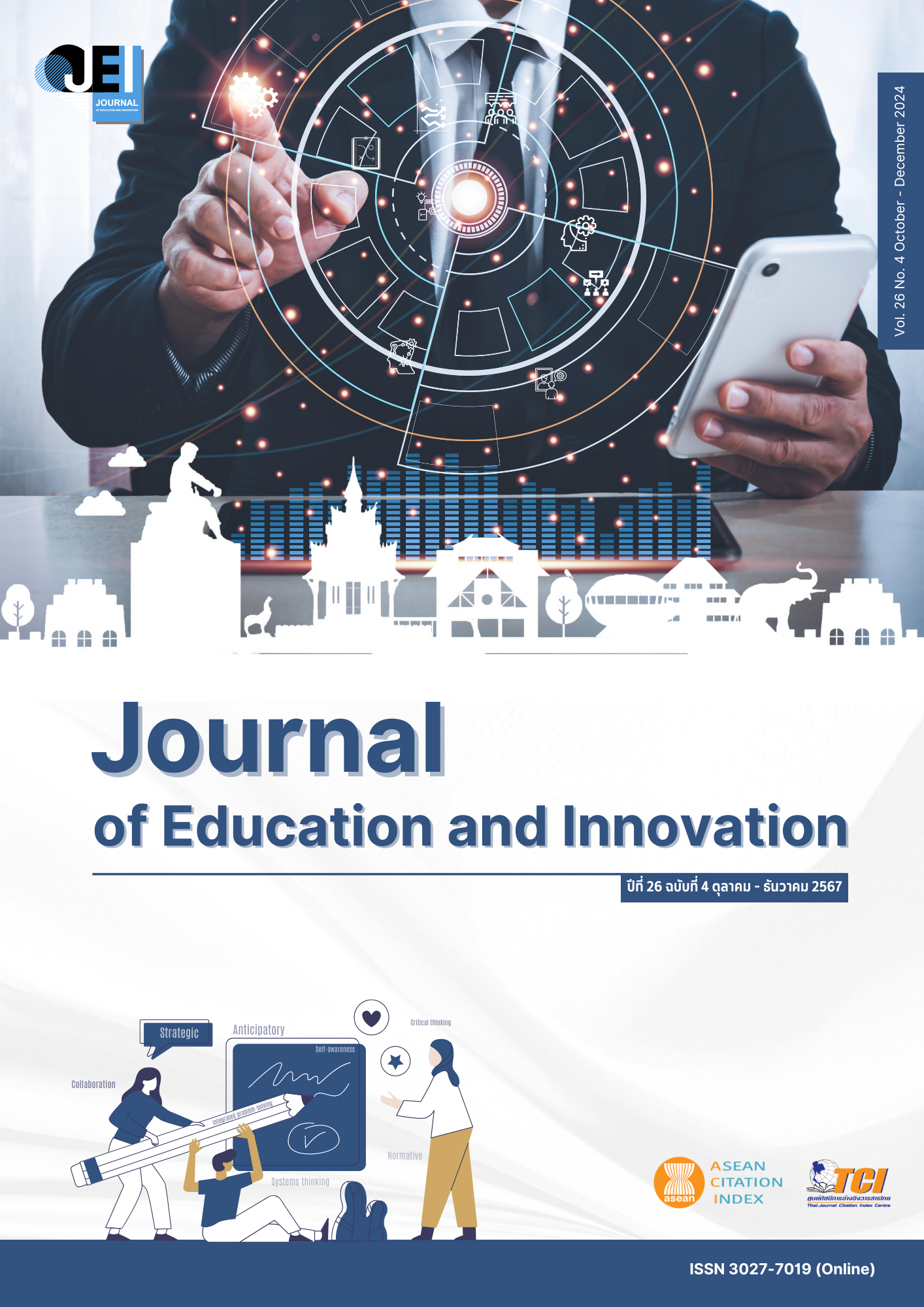องค์ประกอบและแนวทางในการบริหารสู่องค์การนวัตกรรมของโรงเรียนขยายโอกาสทางการศึกษา สังกัดสํานักงานคณะกรรมการการศึกษาขั้นพื้นฐาน
Main Article Content
บทคัดย่อ
การวิจัยครั้งนี้มีวัตถุประสงค์เพื่อศึกษาองค์ประกอบในการบริหารสู่องค์การนวัตกรรมของโรงเรียนขยายโอกาสทางการศึกษา สังกัดสํานักงานคณะกรรมการการศึกษาขั้นพื้นฐาน และเพื่อศึกษาแนวทางในการบริหารสู่องค์การนวัตกรรมของโรงเรียนขยายโอกาสทางการศึกษา สังกัดสํานักงานคณะกรรมการการศึกษาขั้นพื้นฐาน เป็นการวิจัยแบบผสมผสาน โดย 1) การศึกษาองค์ประกอบในการบริหารสู่องค์การนวัตกรรม ของโรงเรียนขยายโอกาสทางการศึกษา จากกลุ่มตัวอย่าง ได้แก่ ผู้บริหารโรงเรียนขยายโอกาสทางการศึกษา จำนวน 340 คน เครื่องมือที่ใช้ในการเก็บรวบรวมข้อมูล ได้แก่ แบบสอบถามมาตรประมาณค่า 5 ระดับ สถิติที่ใช้ในการวิจัย คือ ค่าเฉลี่ย ค่าเบี่ยงเบนมาตรฐาน และวิเคราะห์องค์ประกอบเชิงยืนยันอันดับที่หนึ่ง และ 2) ศึกษาแนวทางในการบริหารสู่องค์การนวัตกรรม ของโรงเรียนขยายโอกาสทางการศึกษา โดยวิธีการสัมภาษณ์ผู้ทรงคุณวุฒิ จํานวน 7 คน จากแบบสัมภาษณ์กึ่งโครงสร้าง วิเคราะห์ข้อมูลโดยใช้วิธีการวิเคราะห์เนื้อหา ผลการวิจัย พบว่า 1.1) ผลการวิเคราะห์ระดับการดำเนินการองค์ประกอบในการบริหารสู่องค์การนวัตกรรมของโรงเรียนขยายโอกาสทางการศึกษาพื้นฐาน ในภาพรวมอยู่ในระดับมากที่สุด เมื่อพิจารณาเป็นรายด้าน พบว่า ด้านบรรยากาศนวัตกรรม มีค่าเฉลี่ยสูงที่สุด รองลงมา ได้แก่ ด้านโครงสร้างองค์การนวัตกรรม และด้านการจัดการความรู้มีค่าเฉลี่ยต่ำที่สุด 1.2) ผลการวิเคราะห์องค์ประกอบเชิงยืนยันอันดับแรก พบว่าองค์ประกอบที่มีน้ำหนักองค์ประกอบมากที่สุด คือ ด้านการบริหารจัดการทรัพยากรมนุษย์ รองลงมาคือ ด้านวัฒนธรรมองค์การแห่งนวัตกรรม ด้านบรรยากาศนวัตกรรม ด้านระบบเทคโนโลยีสารสนเทศและการสื่อสาร ด้านวิสัยทัศน์ กลยุทธ์ เป้าหมายขององค์การ ด้านการจัดการความรู้ ด้านโครงสร้างองค์การนวัตกรรม และด้านภาวะผู้นำเชิงนวัตกรรม ตามลำดับ โดยผลการวิเคราะห์องค์ประกอบเชิงยืนยันอันดับแรก พบว่า โมเดลมีความสอดคล้องกลมกลืนกับข้อมูลเชิงประจักษ์ดีมาก 2) แนวทางในการบริหารสู่องค์การนวัตกรรมของโรงเรียนขยายโอกาสทางการศึกษาประกอบด้วย 3 ส่วน ดังนี้ ส่วนที่ 1 หลักการและวัตถุประสงค์ ส่วนที่ 2 กระบวนการการบริหารสู่องค์การนวัตกรรมของโรงเรียนขยายโอกาสทางการศึกษา ส่วนที่ 3 เงื่อนไขความสำเร็จ
Article Details

อนุญาตภายใต้เงื่อนไข Creative Commons Attribution-NonCommercial-NoDerivatives 4.0 International License.
เจ้าของบทความมิได้คัดลอก หรือละเมิดลิขสิทธิ์ของผู้ใด หากเกิดการละเมิดลิขสิทธิ์ ไม่ว่าวิธีใด หรือการฟ้องร้องไม่ว่ากรณีใด ๆ ที่อาจเกิดขึ้นได้ กองบรรณาธิการวารสารศึกษาศาสตร์ ไม่มีส่วนเกี่ยวข้องทั้งสิ้น ให้เป็นสิทธิ์ของเจ้าของบทความที่จะดำเนินการ
เอกสารอ้างอิง
Chamchoy, S. (2012). Innovative concepts for school management in the 21st century. Journal of Education Naresuan University, 14(2), 117-128.
Chumwongwanapi, A. (2018). Developing the innovative organization model of secondary schools under the Office of the Basic Education Commission (Doctoral dissertation). Chonburi: Burapha University.
Hair, J. F., Black, W. C., Babin, B. J., & Anderson, R. E. (2010). Multivariate data analysis (7th ed.). Upper Saddle River, New Jersey: Pearson Education International.
Higgins, J. M. (1995). Innovate or evaporate: Test & improve Your Organizations IQ-its innovation Quotient. New York: New Management.
Khaosa-ard, K. (2021). Developing management models for innovation in basic education institutions. Journal of Fine and Applied Arts Education Research, 13(1), 421-439.
Ministry of Education. (2001). National Education Act, B.E. 2542 (Revised Edition No. 2), B.E. 2544. Bangkok: Kurusapa Printing Ladprao.
Nampradit, A. (2019). The digital leadership development model of school administrators in the Sarasan Network, Chiang Mai Province. Journal of Social Sciences and Research Network for the People, 4(2), 69.
Noparak, S. (2018). Royal science towards the development of management science. Bangkok: Amarin Printing and Publishing.
Onai, W. (2015). Patterns of private school development toward innovative organizations (Doctoral Dissertation). Phitsanulok: Naresuan University.
Office of the Education Council. (2016). Directions and research agendas for Thai education to achieve sustainable development goals. Bangkok: 21 Century Company.
Office of the Education Council. (2018). Guidelines for the reform of Thai education towards Thailand 4.0 era. Bangkok: Spicy Graphic Company.
Office of the Education Council. (2023). Dynamics of Thai and global education. Bangkok: 21 Century Company.
Pakdeelao, W. (2011). Studying the characteristics of innovative organizations: A case study of award-winning innovative organizations (Doctoral dissertation). Bangkok: National Institute of Development Administration.
Promsri, T. (2021). Becoming an innovative organization: The case of the ministry of industry's secretariat. Journal of Humanities and Social Sciences, Surin Rajabhat University, 23(1), 1-14.
Runcharoen, T. (2010). Professionalism in educational planning and management during the educational reform era: Education for reform, round 2, and external evaluation, round 3. Bangkok: Kaofang.
Rojanatrakul, T. (2020). Developing the innovation organization model of Rajabhat Universities in Thailand. Journal of Academic Affairs College of Management Sciences, Maejo, 3(2), 1-17.
Siriyann, W. (2017). Models that promote the establishment of innovation organizations in Rajabhat Universities in the Northeastern Region (Doctoral dissertation). Maha Sarakham: Mahasarakham Rajabhat University.
The Institute for the Promotion of Teaching Science and Technology. (2016). Results of the PISA 2018 assessment in reading, mathematics, and science. Bangkok: The Institute for the Promotion of Teaching Science and Technology.
World Bank. (2018). A Resurgent East Asia, Navigating a Changing World. Washington, DC: World Bank.
Wutthirong, P. (2014). Innovation management: Resources for organizational learning and innovation. Bangkok: Chulalongkorn University Printing House.
Yotyingyong, K. (2009). Organization of innovation: Concepts and processes. Bangkok: Chulalongkorn University.


